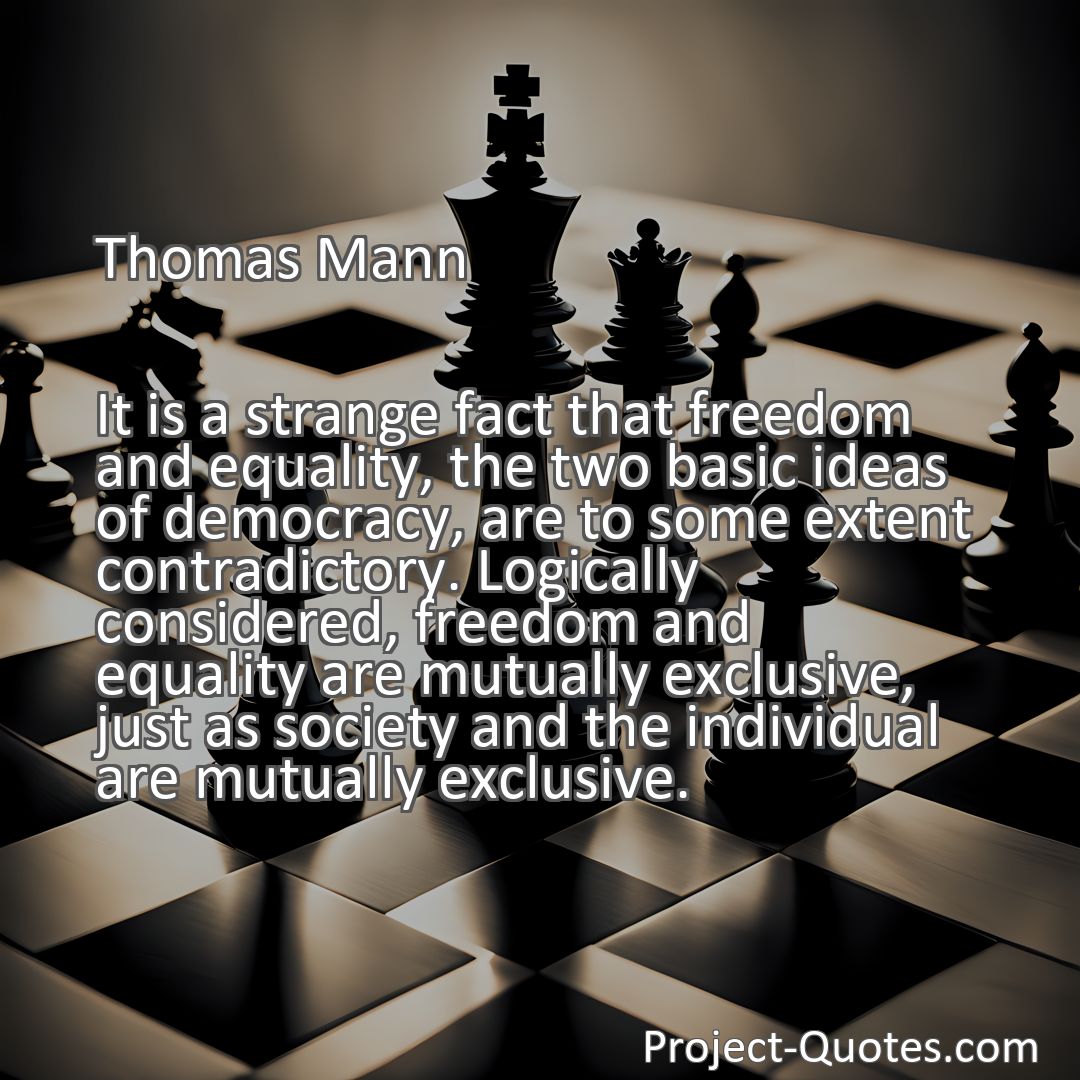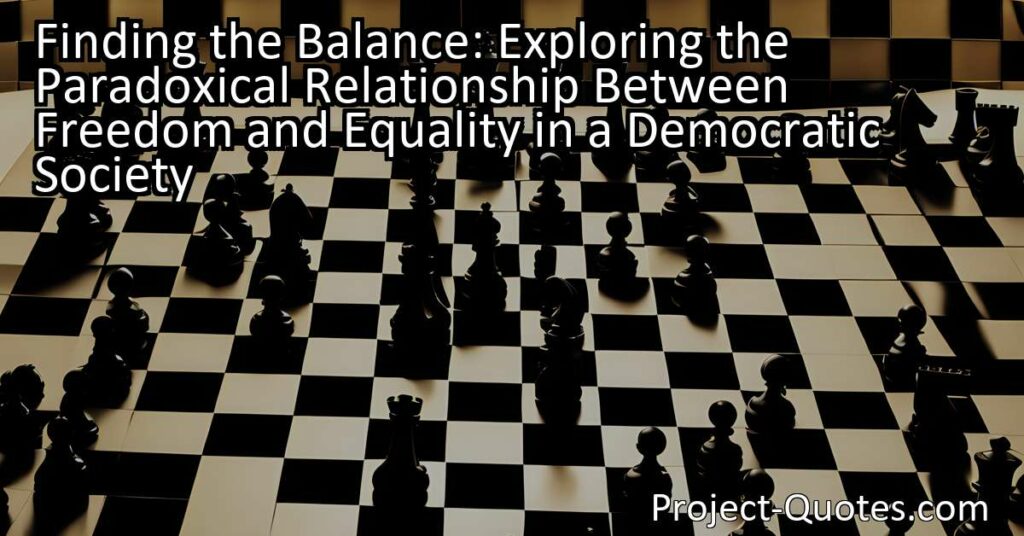It is a strange fact that freedom and equality, the two basic ideas of democracy, are to some extent contradictory. Logically considered, freedom and equality are mutually exclusive, just as society and the individual are mutually exclusive.
Thomas Mann
In “Finding the Balance: Exploring the Paradoxical Relationship Between Freedom and Equality in a Democratic Society,” we delve into the delicate balance needed to maintain both principles. While freedom allows individuals to live life without undue interference, it must be balanced with the need for equality to create a fair and just society. Understanding the interplay between these concepts is crucial for progressing towards a more inclusive and autonomous society.
Table of Contents
- 1 It is a strange fact that freedom and equality, the two basic ideas of democracy, are to some extent contradictory. Logically considered, freedom and equality are mutually exclusive, just as society and the individual are mutually exclusive.
- 2 Thomas Mann
- 3 Meaning of Quote – It is a strange fact that freedom and equality, the two basic ideas of democracy, are to some extent contradictory. Logically considered, freedom and equality are mutually exclusive, just as society and the individual are mutually exclusive.
- 4 Freely Shareable Quote Image
- 5 Related
Meaning of Quote – It is a strange fact that freedom and equality, the two basic ideas of democracy, are to some extent contradictory. Logically considered, freedom and equality are mutually exclusive, just as society and the individual are mutually exclusive.
The Paradoxical Relationship Between Freedom and Equality
Introduction
Democracy is a system of governance that strives to uphold two fundamental ideas: freedom and equality. However, Thomas Mann astutely observes that these concepts often clash, presenting a strange contradiction. In this exploration, we will dive into the paradoxical relationship between freedom and equality, delving into the delicate balance required to maintain both principles within a democratic society. While freedom and equality may seem inherently conflicting, it is essential to understand how they complement each other while recognizing the limitations imposed by social structure.
1. The Essence of Freedom
Freedom is a cherished ideal valued by individuals worldwide. It embodies the ability to make autonomous choices, pursue personal goals, and live life without undue interference. Yet, freedom is not without its limitations. For a society to function harmoniously, certain constraints must be imposed to prevent the infringement of others’ rights. Thomas Mann highlights this paradox by suggesting that society and the individual are mutually exclusive. In other words, while freedom grants individuals autonomy, it cannot exist without the interconnectedness and dependencies within society.
2. Understanding Equality
Equality, on the other hand, seeks to create a fair and just society where all individuals have equal opportunities and rights. It revolves around the notion that no one should be denied basic necessities or discriminated against based on inherent qualities such as race, gender, or socioeconomic status. However, achieving perfect equality is a complex task. Mann’s assertion that freedom and equality are logically exclusive reveals the inherent tension between individual liberties and the need for equal treatment. Balancing these two concepts necessitates careful consideration and compromise.
3. The Balancing Act
The coexistence of freedom and equality requires navigating a delicate balancing act. While they may seem contradictory at first, deeper examination reveals the ways in which they strengthen and enhance democratic societies.
a) Safeguarding Individual Liberties: Freedom is the cornerstone of democracy, ensuring that personal choices and beliefs are respected. As such, society must safeguard individual liberties, allowing citizens to freely express themselves while maintaining a sense of social order. This necessitates striking a balance between unrestricted personal freedoms and preventing actions that may harm others or infringe upon their rights.
b) Addressing Social Inequalities: Equality necessitates addressing social disparities, promoting equal access to resources, opportunities, and justice. Democracy thrives when all members of society can reach their full potential without discrimination. Embracing equality does not mean everyone is the same; instead, it provides a level playing field for individuals to pursue their dreams unencumbered by systemic biases.
c) The Role of Civic Responsibility: Achieving the equilibrium between freedom and equality requires active citizen participation and civic responsibility. In a democracy, citizens must both enjoy their personal freedoms responsibly and contribute to the well-being of society as a whole. Recognizing the interdependence of the individual and society leads to a more harmonious coexistence.
4. Real-World Examples
To understand the complexities involved in balancing freedom and equality, we can explore real-world examples that demonstrate the challenges faced by democratic societies. For instance, debates surrounding freedom of speech often test the limits of individual liberties when hateful or harmful speech threatens the rights and safety of others. Striking a balance between allowing free expression and protecting vulnerable communities reflects the inherent tension between freedom and equality.
Other examples include affirmative action, income redistribution, and dismantling systemic discrimination. These policies aim to rectify historical inequalities, but they can also be perceived by certain segments of the population as curbing individual freedoms. These cases illustrate the intricacies democratic societies face when attempting to reconcile freedom and equality.
Conclusion
Freedom and equality are not diametrically opposed, but they are intrinsically linked and require careful harmony within a democratic framework. Thomas Mann’s observation amplifies the significance of finding the elusive balance between these ideals. While democracy’s journey is fraught with challenges, embracing both concepts enables societies to progress and evolve. By recognizing the interconnected nature of freedom and equality, we can work towards a more inclusive and just society while respecting the autonomy of individuals.
I hope this quote inspired image brings you hope and peace. Share it with someone who needs it today!


